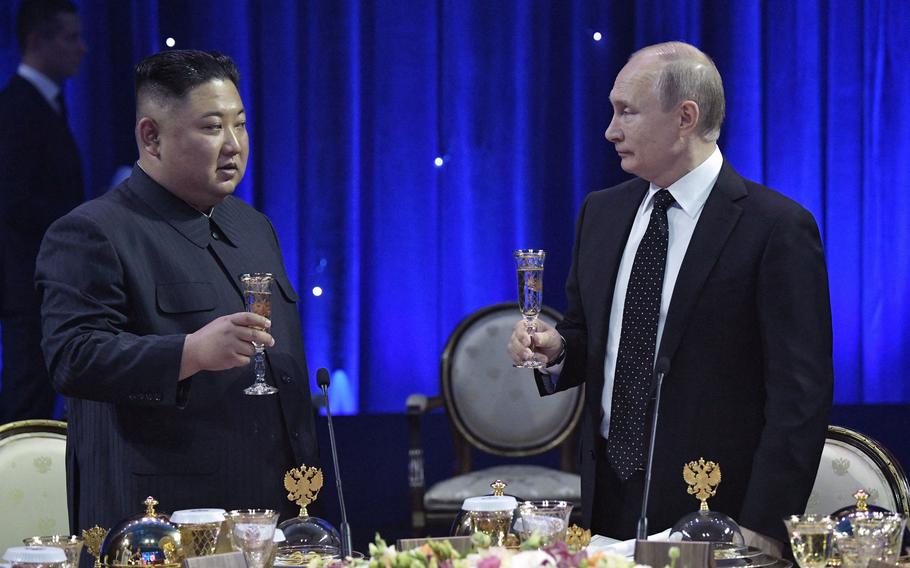
In this photo from April 25, 2019, Russian President Vladimir Putin and North Korean leader Kim Jong Un attend a reception following their talks at the Far Eastern Federal University campus on Russky island in the far-eastern Russian port of Vladivostok. (Alexey Nikolsky/TNS)
(Tribune News Service) — Russia’s “complete embrace” of North Korea could increase Kim Jong Un’s appetite for risk when it comes to threatening South Korea and exporting weapons abroad, as well as helping Pyongyang ignore Washington’s call to return to nuclear talks, a senior Biden administration official said.
As North Korea ships weapons to help power President Vladimir Putin’s war in Ukraine, Pyongyang has benefited from the “whole gamut” of improved diplomatic ties with Russia, from economic and security assistance to high-profile visits by top Russian officials, the State Department’s senior official for North Korea, Jung Pak, said in an interview Monday.
“This could lend this once-isolated country the luster of legitimacy that it does not deserve, and it should not have,” Pak said. “We’re concerned about what that might do to make Kim think that his leash is longer than it really is, and how that might figure into Kim’s risk calculus.”
North Korea has so far shipped around 11,000 containers of munitions to Russia as well as 40 ballistic missiles used in Ukraine, Pak said. That has bolstered Putin’s forces after they got bogged down when their initial advance failed to take Kyiv, and as Russia’s defense industrial base was eroded by a wave of Western sanctions aimed at damaging Russia’s economy.
South Korea’s Defense Minister Shin Wonsik has said that Seoul estimates the containers could hold about 3 million rounds of 152 mm artillery shells used by the Kremlin in its bombardment of Ukraine. This has bolstered Putin’s arms stocks while Kyiv’s ammunition supplies have dwindled as military aid has been held up in the U.S. Congress.
Russia in return is providing North Korea with food, raw materials and parts used in weapons manufacturing, Shin said. The food aid has helped Kim stabilize prices for necessities and the military aid could increase Pyongyang’s threat to the region, he added.
The value of the artillery alone is likely several billion dollars, and the aid from Russia could represent the biggest boost to North Korea’s economy since Kim took power. Moscow and Pyongyang have denied the arms transfers accusations despite a multitude of satellite photos released by research groups and the U.S. government showing the flow of weapons from North Korea to Russia and then to munitions dumps near the border with Ukraine.
One substantial way North Korea has benefited diplomatically from its burgeoning relationship with Moscow has been Russia’s veto of a United Nations Security Council resolution to extend a panel of experts that has reported on North Korea’s development of its nuclear arsenal for 15 years, Pak said.
There is now a real risk the high-profile nature of North Korea’s relationship with Russia could make its armaments more appealing to other groups around the world, Pak said. South Korea has already said that North Korean weapons have been used by Hamas, a U.S.-designated terrorist group, against Israel as the war in Gaza drags on.
“The luster of legitimacy could give other bad actors ideas about North Korea’s weapon systems,” she said. “And North Korea has had a long history of proliferation in the Middle East, Africa, elsewhere. And we don’t want that to start blossoming into other proliferation relationships. So this is not just a Northeast Asia problem.”
Kim has shown off some of his newest weapons systems by displaying tests on state media. North Korea’s propaganda apparatus on Tuesday lauded its latest test overseen by Kim a day earlier of a simultaneous launch of short-range ballistic missiles in what it billed as its quick counterattack capability in a “nuclear trigger” system.
While North Korea has flouted Western sanctions and efforts to halt Russia’s war machine, Chinese firms have also been crucial to reestablishing the Kremlin’s defense industrial base with dual-use technologies and other components, the U.S. has said. Chinese companies and banks have also been blamed for facilitating payments to North Korean entities, with that money funding Kim’s nuclear weapons and ballistic missile programs.
U.S. Secretary of State Antony Blinken plans to bring up North Korea’s provocations when he visits China in the coming days, department spokesman Matthew Miller told reporters at a news briefing.
While Treasury Secretary Janet Yellen, on a recent trip to China, threatened Chinese financial institutions that aided Russia’s war with sanctions, it wasn’t clear whether the U.S. would take similar actions when it comes to Chinese banks that are involved with North Korea.
Asked whether the U.S. is currently weighing a similar threat of sanctions on Chinese banks involved with Pyongyang, Pak said: “I’m not going get into specifics, but we of course are considering all of the measures, in terms of both positive and negative actions, that we can take to get better sanctions compliance, sanctions implementation.”
©2024 Bloomberg L.P.
Visit bloomberg.com.
Distributed by Tribune Content Agency, LLC.